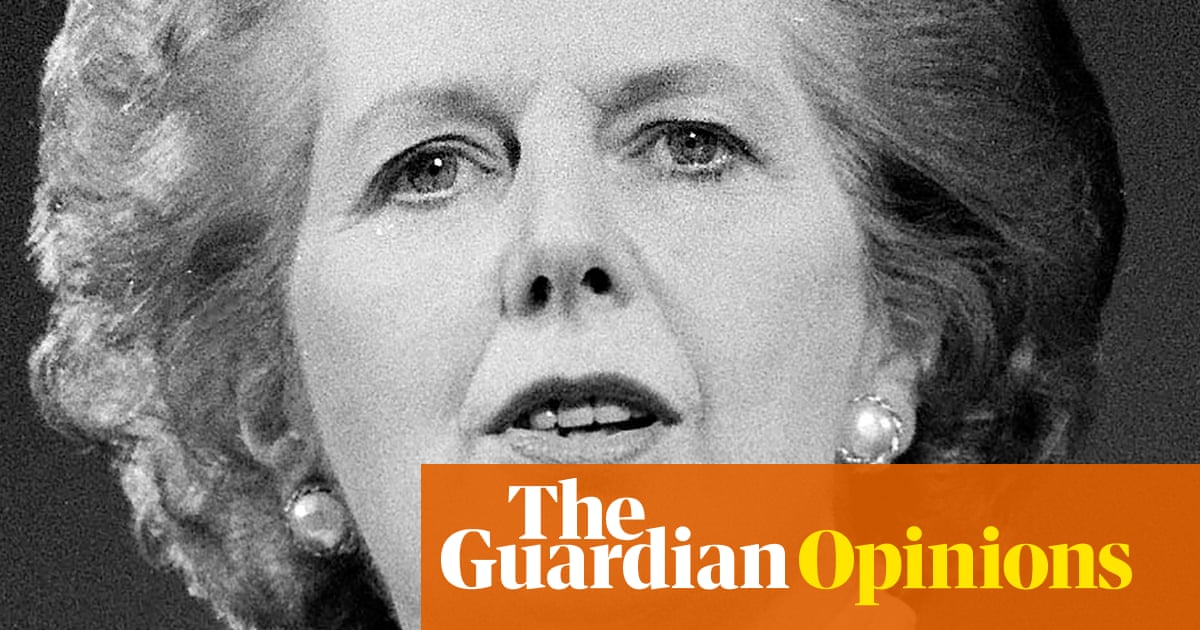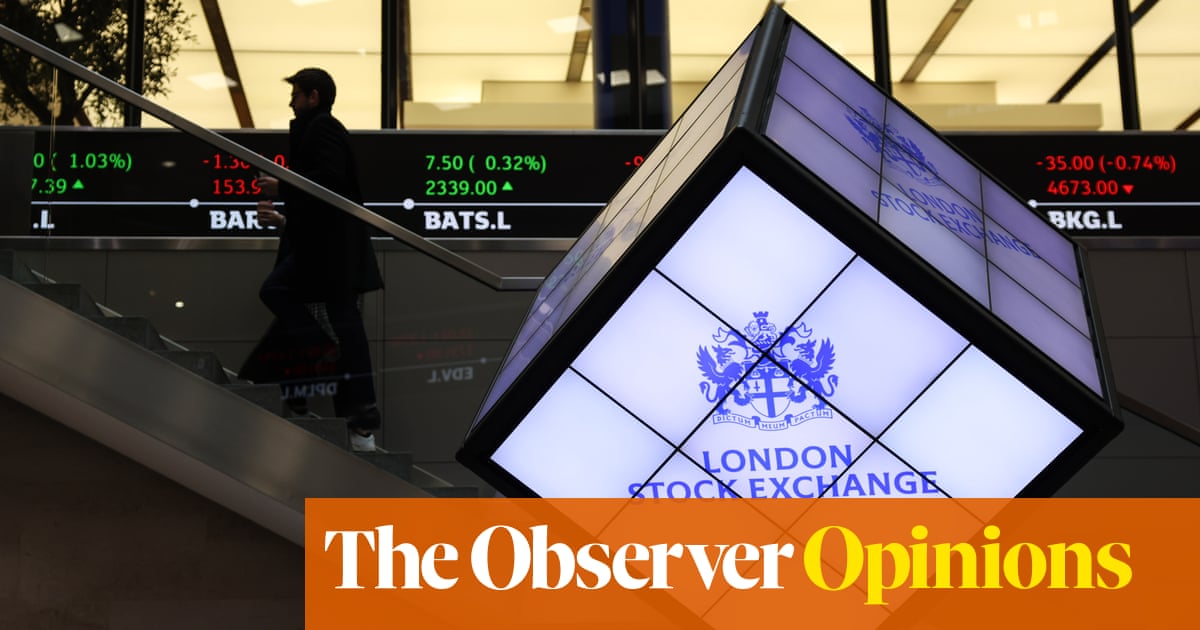
An old spectre is haunting Britain yet again – the spectre of Thatcherism. Although she became Tory leader almost half a century ago and was sacked by her party in 1990, since when this country has changed hugely, Margaret Thatcher still obsesses the Tories. Rishi Sunak says he is a Thatcherite, and so do almost all those jostling to replace him: Kemi Badenoch, Penny Mordaunt, Priti Patel, James Cleverly, Grant Shapps and Suella Braverman.
Most other Conservative MPs remain Thatcherite in their basic assumptions: about the need to deregulate markets, regulate the lives of the poor, pursue aggressively nationalistic policies abroad and fight domestic culture wars. This outlook is shared by many Tory members and voters, most rightwing thinktanks and almost the entire rightwing media. Meanwhile the party’s strengthening rival, Reform UK, sounds increasingly Thatcherite, campaigning against “record taxes, wasteful government spending and nanny state regulations”. Arguably, her hegemony is more complete now in conservative parts of Britain than it ever was during her contentious leadership, about which the right was often divided.
Even more strikingly, her iconic status is also being sustained by Labour’s most senior figures. Last November, the shadow chancellor, Rachel Reeves, said: “My generation of women, of course we have been influenced by her.” In December, Keir Starmer said that she “sought to drag Britain out of its stupor by setting loose our natural entrepreneurialism”. Last month, the shadow foreign secretary, David Lammy, said she “was a visionary leader for the UK – no doubt about it”.
These homages from the party she tried so hard to destroy are often justified by the need to appeal to Tory voters and journalists in the run-up to the election. It’s a familiar, if humiliating, Labour ritual. Whether this also drives leftwing voters away from the party is a question that neither its current leadership nor the media show much interest in asking.
Even when Labour has a leader with less time for pro-Tory political conventions – as it did with Jeremy Corbyn and to a lesser extent Ed Miliband – a respect for Thatcher among some on the left remains. “She was a conviction politician, and I think conviction really matters,” Miliband said in 2012. In 2019, the radical economist Christine Berry wrote an article headlined: “Thatcher had a battle plan for her economic revolution … the left needs one, too.”
Whatever your politics, it’s perfectly rational to see Thatcher as a key figure: one of few modern prime ministers to profoundly change the country. What’s much less rational, however, is to revere her with few reservations, when the wreckage left by her government is still piling up all around us.
From the crisis at Thames Water, a company created by her naively pro-monopoly privatisation programme, to the precarity and spiralling cost of renting a home – both products of her curtailment of tenants’ rights and council housing – her policies’ flaws, limits and unforeseen consequences are ever more apparent. Less directly but just as damagingly, her hostility to the EU, to taxing the rich properly, and to most state services except the military, set this country on a path towards today’s European isolation and public and private poverty. Thatcher was elected prime minister largely because she promised to reverse national decline, an approach Starmer is trying to emulate. But along with the Tory successors she so influenced, she can now be seen as having caused such a decline instead.
Why is this so rarely said? The passage of time has certainly helped her reputation. The diminishing amount that is widely remembered about her reign – her victories over the miners and the Argentinians, her electoral landslides, economic boom and commanding manner – has fixed her in the public mind as a divisive but essentially successful prime minister. Her government’s failures and ineffective periods, for instance, the terrible recession that her policies created in the early 80s, or her vain attempts to reverse progress towards racial and sexual equality through reactionary legislation, are largely forgotten. Instead, she has become a free-floating signifier of strong leadership, untethered from much of her actual record.
If this country were not so influenced by rightwing myths, the romanticisation of her premiership would matter less. It might just be something for academics to argue about. Yet instead we have a national narrative, shaped by films, documentaries and popular histories, as well as by parliament and the press, that treats Labour premiers with long lists of achievements, such as Harold Wilson and Tony Blair, as at best, deeply flawed, while seeing Thatcher – The Iron Lady, the 2011 biopic called her – as a unique, if not very likable, modern Downing Street success. The idea that the Tories are more natural rulers than Labour is thus further entrenched.
One of many challenges Starmer is likely to face if he becomes prime minister is how to create what he calls “an economy that works for working people”, which sounds very different from the one Thatcher helped establish, and which worked primarily for bankers, property developers and business executives. For a politician who sheds policies like a sweaty football kit after one of his five-a-side games, Starmer seems unusually committed to making the economy more equal, as does the shadow chancellor. New Labour never talked about the economy in such class-conscious, egalitarian language.
Yet by also emphasising their respect for Thatcher and suggesting that 1970s Britain needed rescuing by “setting loose” its “natural entrepreneurialism”, Starmer and Reeves also reinforce the right’s worldview. They ignore veteran activists and revisionist historians who point out that the 1970s, while economically troubled, were also a time of vibrant new social movements and unparalleled equality.
Until the next election, and even during the first year or two of any Starmer government, his contradictory approach to Thatcherism and conservative ideas generally – simultaneously positioning his party both to the right and the left of where New Labour stood – may not be a problem. Public relief at having a more competent, less extreme and corrupt government than the Tories may keep Labour popular enough.
But in the end, Starmer will probably have to choose whether to completely break with Thatcherism. Unlike during Blair’s lucky government, the condition of the economy and state finances is likely to mean that questions about how best to distribute resources will be unavoidable. Thatcher faced these questions during her difficult first few years in power, and we’re still living with the consequences of her answers. The one useful thing Starmer can still learn from her is to have the confidence to look at the other side’s ideas, and conclude that their time is up.
Andy Beckett is a Guardian columnist












